EBR charges a service fee to manufacturers to produce ebike reviews and videos, this began in 2018. It’s the same flat fee for each video, and it helps us to keep the site going while limiting ad clutter. We appreciate the opportunity to serve you with our opinions and data but respect your right to know that we receive compensation :)
I’m most familiar with the Piaggio company because of their gas powered Vespa scooters, which were launched in 1946… but the parent company is actually a lot older than that! dating all the way back to 1884. Their latest product offering is a line of electric bicycles called Wi-Bike. The Active models, that I’m focusing on with this review, offer Class-3 speed pedelec performance with up to ~27 mph pedal-assisted speeds that are activated through advanced cadence and torque sensors. The bikes feel smooth and stable, pedaling is efficient, and the motor is relatively quiet. If you opt for the belt drive system, it will produce even less noise and stay cleaner. The video review above shows several different models but I focused in on the Active Plus, which pairs the belt with an auto-shifting continuously variable transmission hub from NuVinci, called the NuVinci N360 Harmony. This model retails for $3,999 vs. the stock Active model which uses a still-good Shimano Deore 10-speed derailleur and traditional metal chain for $3,499. The standard Active model seems to be setup more for commuters because it includes a rack, adjustable-angle stem, and suspension seat post. If you’re looking for luxury, aren’t so worried about hauling cargo, and appreciate the latest auto-shifting technology, then the Active Plus model is perfect. And of course, you can always swap the stock rigid seat post with a 31.6 mm suspension post like this to match the dual-suspension feel of the standard Active model. In my opinion, what sets the Wi-Bikes apart from other ebike products on the market right now is their style, premium accessories (like tubular alloy fenders, integrated lights, and color-matched chain guard and battery casing), along with the service you will get from Vespa dealers who will begin carrying the bikes in 2017/2018. Actually, it sounds like some independent electric bike dealers will also be stocking Wi-Bike… Similar to most other high-end ebike brands, the Wi-Bike products come with a two-year comprehensive warranty, and there’s a line of optional accessories like racks, bags, and locks designed to fit perfectly. During the ride test portion of this review, I noticed how evenly weight was distribution across the frame. It felt stable and coasted easily even when I took my hands off the bar, thanks to larger 700c 28″ wheels. All current Wi-Bikes models are longer than most competing electric bicycles I’ve covered, by about seven inches, due to the battery position behind the seat tube. I love that they offer this bike in two colors (silver being my favorite, for improved visibility at night) as well as two frame sizes. The black spokes, deep-dish rims, reflective tires, and leather touch points make this product look and feel more like a Vespa than a bicycle, and I was amazed at how many features were built into the optional smartphone app. It’s quite good… and you can charge your phone while riding the bike because the display mount has a USB Type A port on the left side! The app has GPS tracking and alerts built in, so you can rest easy that your investment is safe at the rack during work… or at least, somewhat findable if it gets stolen. This service is included free for the first two years but then costs something like $35/yr, which seems very reasonable to me. Helping with this review was a gentleman named Andrew, from Vespa Brooklyn, who was dressed very nicely in a long sleeve shirt. He talked about riding the bike to work without getting sweaty but also mentioned how it can be used to get a workout when paired with a heart rate monitor! You can tell the bike to adjust electric assist to help you hit and maintain a set heart rate, which is very unique. Also helping with this electric bike review was the Wi-Bike Project Lead for North America, Larry Ferracci, and my friend, Chris Nolte, from Propel bikes (a competing ebike-only shop located just down the street in Brooklyn, NY). I tried to be comprehensive with the specs, measurements, and ride test which are all available as part of this review. And, you can explore the lower-speed Wi-Bike Comfort model in this review, as it costs less and is available in step-thru frame style for riders with hip and knee sensitivity.
Driving the bike is a 350 watt nominally rated mid-drive motor that has been designed, developed and produced by Piaggio in Italy. This is a company which has been producing gas powered motors for over 100. For people who live in Europe and have access to the Wi-Bike line, the motor may be rated at 250 watts to comply with local legislation. The motor controller measures rear wheel speed, pedal speed, pedal cadence, and pedal torque to provide a responsive and natural feel. It can produce up to 80 Newton meters of torque, according to their literature, which is above average for mid-drives. I cannot confirm, but perhaps the lower speed motor only offers 60 Nm of torque, as this is what I was told during the preparation phase of the review, and that is still about average and very capable if you shift appropriately for climbing. These motor units are a bit heavier than the competition, at about 9.9 lbs. I found that the Cruise model motor started and stopped with a bit of delay compared to the Active Line which is more zippy. You can see the chainring activate and spin down after I stop pedaling in the video above, and you can hear the high-pitched electronic whir soften as I pedal slower. Considering that this bike is rated up to ~28 miles per hour, I found that it mostly stayed in the ~26 mph range, and that may be due to the auto-shifting of the NuVinci compared with traditional gearing. I did not have difficulty climbing hills, and I rode mostly with a higher cadence of 74 RPM vs. the default 60 RPM because I come from a road cycling background where spinning is common, and I have a sensitive knee. It was easy to change RPM settings once I was at the appropriate menu on the display, but wasn’t as immediately intuitive or fast as using a traditional physical shifter. Shifting gears with the NuVinci N360 Harmony is a unique experience, and it caught me by surprise as the bike naturally adjusted to the way I was pedaling… If I pedaled harder, the bike went faster, but my RPM remained fairly constant. The motor on this bike does not have shift detection and if you were pedaling hard in the highest level of assist (perhaps while climbing) and tried to shift down using the cassette and derailleur (stock on the standard Active model), it would mash and bang a bit as shown in the video, causing wear on the drivetrain. So, while the NuVinci is heavier by ~3 lbs and more expensive, it does seem very durable and well suited to this motor. My favorite part about the motor is actually how hidden it is. Piaggio has done a great job matching the plastic covers and protectors around the motor and battery to make it stealthy.
Powering the bike is a 37 volt 11.6 amp hour battery pack mounted just behind the seat tube. I would call the 417.6 watt hour capacity somewhat average for the 2018 timeframe, where many products are hitting the 500 watt hour mark without being any heavier. The pack itself weighs about 6.1 pounds and can be charged on or off the frame. The charge port cover has a spring built in and works very well, there’s much less screwing around with a dirty rubber flap like on other e-bikes. If you decide to remove the battery for safe keeping or more convenient charging, there’s a large comfortable handle built into the top. The battery locks onto the bike frame using a trusted AXA locking core and then tips out to the left when being removed. I think it would be neat if AXA offered a keyed-alike program for this lock so that you could match it to the optional cafe lock from Piaggio (also made by AXA) or other folding/u-lock accessories like this. As it stands, you may end up dealing with several unique keys. In closing, the battery gets the job done and its capacity will be spent efficiently if you shift gears thoughtfully or set the cadence at a medium or quick pace. Mid-drive motors are frequently praised for their ability to go further with the same energy as a hub motor… and while I could not range test the bike during this review, I have no reason to think that it would not be comparable or even better than the zippy Bosch Performance Line Speed motor which is rated very similarly in terms of specs with 75 Nm of torque and 350 to 570 watts output. I do wonder how the plastic casing around the battery pack works, and if it can be transferred to a different battery pack if/when it starts to run low and requires replacement after several years of continuous use? That could increase the price and complexity of replacement, but if you store the pack in a cool-dry location and keep it at ~50% capacity when not in use, it should hold up very well over the long term. Perhaps the paint-matched shielding can be re-attached to a new battery?
Operating this electric bike is potentially more involved than other products, but that’s only because it provides so many cool features AND handles shifting (if you get the Active Plus model)… You don’t have to use the fancy app features if you don’t want to. The included LCD display is removable, backlit, and easy to activate on its own. Just press the power button on the control pad near the left grip and then cycle through the three levels of assist, watch as the speedometer changes, keep track of your battery capacity, and keep an eye on the gear info-graphic which communicates motor power and rider pedal power back to back, so you can see how much the bike is helping. The Mode key lets you cycle through trip stats as well as the NuVinci pedal RPM settings which is how you “change gears”. If you’re off the bike and walking it through a crowded space or pushing it up a hill… or possibly dealing with a flat tire, you can use walk-assist by arrowing down to the no-assist level and then then hold the walk mode button. If you hold the mode key on the display, you can enable bluetooth in the settings menu and connect your Android or iOS smartphone using the Wi-Bike App. This is where the real fun begins! Rather than just three levels of assist, the app provides ten power steps and four different ride modes including Fitness, which can sync with a heartrate monitor (as mentioned earlier). The app even lets you create a profile and will recommend tire pressure and saddle height all based on your body measurements like height and weight. It can even do GPS route planning and remember you “home” to make it easy to get around. I love that the app has a battery percentage readout as well as the five-bar infographic to really let you track and plan rides, and avoid getting stranded. I’m glad that the bike charges pretty quickly with the four-Amp charger, it’s just a little bulky and heavy compared to some others I have seen and I really cannot imagine carrying along a secondary battery pack because of the bulkiness of the design and big handle ontop. Sometimes it’s nice to just have a simple display to work with and other times it can be fun to geek out and dial the settings in. I like that you can completely remove the stock display and use your phone as both the key fob and settings adjuster for the bike if you want. This entire system feels more like an automobile or just a premium scooter to me, the hardware feels durable and the software is deeper, this helps to justify the higher price point.
All things considered, I really enjoyed the Wi-Bike Active and Active Plus. They offer the unique belt drive + CVT combination which is smooth, quite, and durable. The motor seems like a good fit in terms of performance and stability while also being durable and efficient. I trust Piaggio, so even though this is a relatively new motor for the United States market, I feel that it will be well supported and probably very durable. I like all of the integrated accessories, especially the lights, and am a big fan of hydraulic disc brakes. Performance was good, style was great, and the app was fantastic. Depending on your needs and tastes, this could be a great bike to consider. There is room for improvement with the addition of bottle cage bosses, and as Chris mentioned in the video, you might want to stock up on some long-stem inner tubes because the deep dish rims require something like 60 mm presta valve stems vs. the stock 48 mm. I feel that 10-speed Shimano Deore version of standard Active (vs. the Active Plus) would be lighter, shift quicker, and allow you to hit slightly higher speeds. At the time of this review, there were nine dedicated dealers of the new Wi-Bike products in North America, but that number is growing. Some of the final little highlights I noticed were guides on the rear sprocket and chainring to keep the belt on track, excellent motor assistance at higher RPM pedaling (at least 120, and possibly even higher), and just how smooth the motor started and stopped. Big thanks to Vespa Brooklyn and the Piaggio team for meeting me with several bikes and partnering with me on this post. They helped to pay for my travel and accommodations to make this review possible and provided support in figuring out all of the technical nuances of the app.
Pros:
- Very nice integrated lights, the headlight points where you steer and is aimable while the backlight is positioned out of the way for a rack or clothing that might hang down, the silver frame color option would stand out at night and the tires have reflective sidewall strips to further increase the visual footprint of the bike
- Sturdy dual-layer tubular Aluminum alloy fenders will keep you dry and clean without rattling and the chain/belt cover is also sturdier than I usually see, it will keep your pant legs grease/snag free
- Belt drives tend to be quiet and durable because they maintain a fixed length, many ebike shops have told me that belts don’t require as much service or tuning as chains
- The frame is beautiful, look at the smooth welds and unique bladed accents near the base of the downtube and just behind the seat tube (where the optional rack would connect), this thing is purpose-built and all of the wires and cables are neatly tucked away, the fork and chain cover are perfectly paint-matched in color
- Battery and motor weight are kept low and center on the frame, which improves stability and handling, the wheelbase is a bit longer which isn’t as snappy and maneuverable, but it still rides comfortably (most ebikes I measure are ~72″ long and this one is ~79″ long because the battery is behind the seat tube which makes the chain stays longer)
- The NuVinci continuously variable transmission can be shifted at standstill and isn’t as susceptible to damage or wear when combined with a mid-drive like this (compared to a geared hub or traditional cassette with sprockets), it does weigh more and cost more though
- Most of the standard NuVinci CVT drivetrains I see use mechanical shifting where you have to grip hard and twist to adjust gearing ratios, but this one is purely electronic (using the Harmony system and the ebike display), it shifts itself automatically to keep you pedal cadence RPM constant so you can focus on steering and enjoying the ride
- I love that the battery pack is removable, for convenient charging and protection (store away from extreme heat and cold), and that the display is also removable and acts as a key to unlock the bike, the front wheel is attached with a security bolt vs. quick release so it’s going to be tamper resistant if you’re commuting and park at a public rack
- Nice Shimano hydraulic disc brakes, the adjustable-reach levers are going to be easy to pull and hold whether you’ve got long or short fingers
- The battery has a large, comfortable handle at the top which makes it easy and safe to carry around, I like how it tips into the mounting position and appreciate the design that WiBike is using for the charging port cover (a little plastic spring loaded door to keep dust and water out when riding), just be careful with the bike if you charge the pack mounted because the cable will be near the left crank arm and could get bent or sheered off
- Nicer flick bell to signal pedestrians while riding, upgraded and enlarged plastic platform pedals for improved grip and traction compared to the Comfort models
- Hydraulic disc brakes from Shimano provide good stopping power, note the larger front rotor, it’s good to have this sort of brake setup because the bike is a bit heavier than average at ~60 lbs (in part because of the NuVinci CVT drivetrain on the bike I reviewed)
- It’s neat that Piaggio has created an app to let you plan routes, get diagnostics, and even learn how to set your tire pressure and seat height correctly, but you don’t need to use this if you prefer to rely on the LCD display only, one other cool feature is GPS tracking to help recover bikes if they get stolen and Piaggio offers two years of free data with the purchase as I understand it
- Piaggio sells a branded line of accessories, such as the trunk bag, so you can maintain the beautiful look and brand consistency across the bike, the trunk bag had some reflective fabric on it as well as zip-down panniers on both sides
- I believe that the Wi-Bikes are only sold through dealers, but it appears that Vespa has a large network of dealers so finding and test riding the product could be easier, as well as getting help with the two-year warranty should something go wrong
- The motor is custom made for Piaggio but seemed very high quality (comparable to the Yamaha or Bosch Active Line motors in terms of build and performance for me), it measures four signals including rear wheel speed, pedal cadence, pedal speed, and pedal torque for fluid operation
- The mount for the display has a full sized USB Type A female port built in so you can charge portable electronics and maybe keep your phone full while using the app and riding
Cons:
- All of the Active Line Piaggio Wi-Bike electric bike models are built around a high-step frame, this adds stiffness and is a good choice for higher speed riding, but might be difficult to mount and stand over for petite riders… at least they offer two frame sizes here and if you get the standard Active model there’s an adjustable-angle stem for upright or forward body position
- The headlight is very nice, I love how the top portion is cut off and the beam is aimed down so you don’t blind oncoming cyclists or traffic, however, they did mount this light to the lower moving portion of the suspension fork and it could bounce around more as a result
- The sleek mono-shock offers a bit of comfort but isn’t as plush as full size suspension forks with two stanchions, the deep-dish rims could ride stiffer and there’s no suspension seat post… even the flat bar, flat grips, and active saddle are a bit sporty, consider adding your own 31.6 mm suspension seat post aftermarket if you ride on bumpy terrain frequently
- This bike is priced a bit higher than average considering it is using a proprietary drivetrain, but the frame had to be custom made to work with the belt (since it cannot be unlinked like a chain) and you do get a feature-complete setup here with an excellent two-year warranty and dealer support
- The motor casing is larger than many of the other mid-motors I have seen and test ridden, the motor itself weighs more as well at ~9.9 lbs vs. 6.61 lbs for the Brose Drive T and 8.8 lbs for the Bosch Performance Line
- This bike does weigh a bit more than average at ~60 lbs, and I think that has to do with the custom mid-motor, NuVinci CVT drivetrain, metal fenders, and the longer frame
- It looks like they thought of everything, except for bottle cage bosses, even on the high-step frame! That’s a bummer because sometimes I like to ride without bags or a backpack but want to bring some fluids to drink or maybe a folding lock, and there’s nowhere to mount that here by default, you might have to use an aftermarket adapter and those just aren’t as sturdy or good looking
- The battery charger is quite big and weighs more than average at ~2.4 lbs, this could make it difficult to bring along (taking up more space in your backpack) but at least it fills quickly with 4 Amps vs. a lot of basic chargers that just fill at 2 Amps
- I wasn’t able to figure out how to de-activate backlighting on the display, it’s a minor gripe, but sometimes the bright light can be distracting and it would be nice to have some adjustability there
- I wish they offered the AXA frame lock option keyed-alike so that you didn’t have to use two sets of keys if you plan on locking the bike frequently that way, or even three sets of keys if you also get a u-lock or cable lock to be very secure
- Because this bike is longer than average, it could be difficult to fit through angled spaces or store in small sheds and closets, it has an addition ~7 inches to deal with and the rear fender could get bumped (or the light that’s mounted lower on it)
Resources:
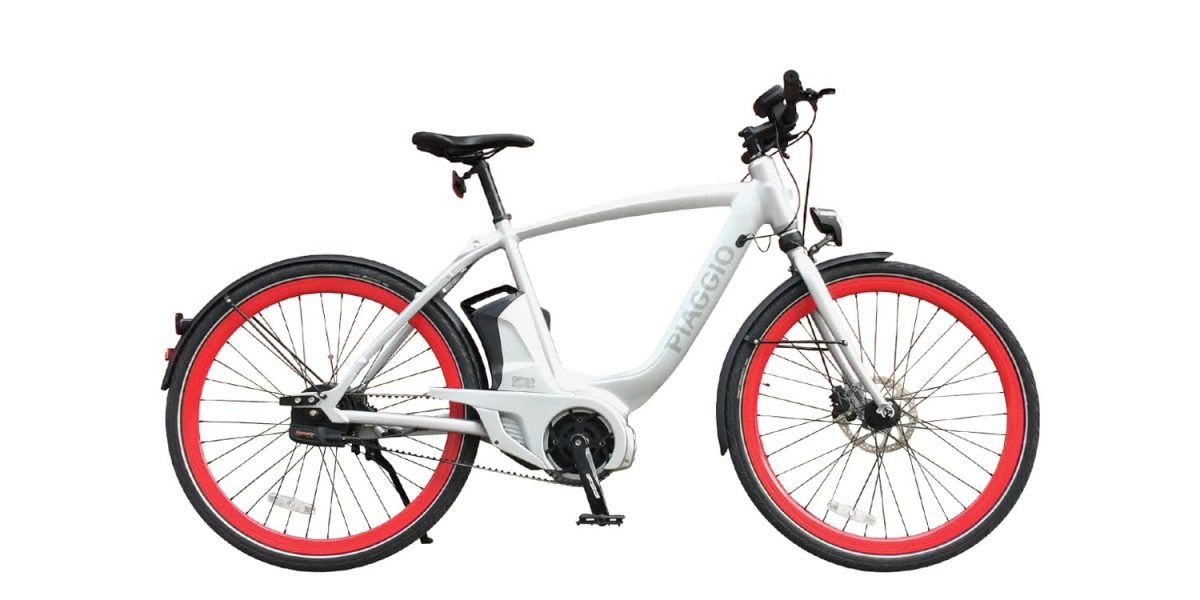




















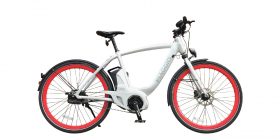
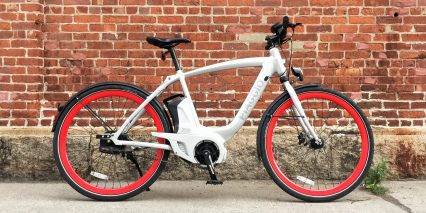
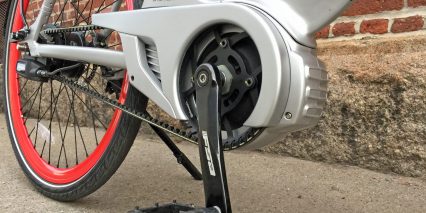
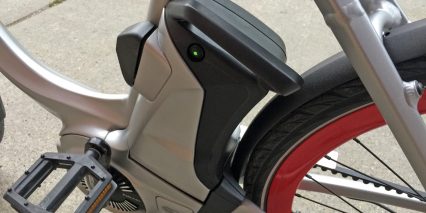
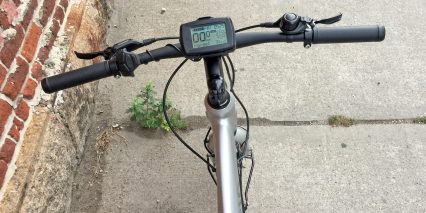
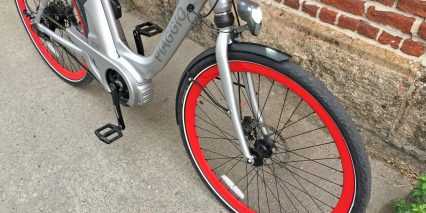
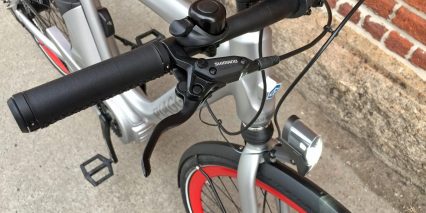
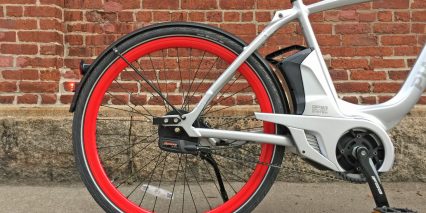
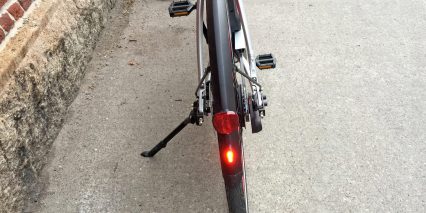
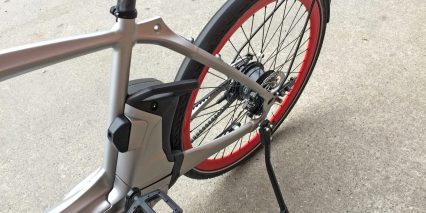
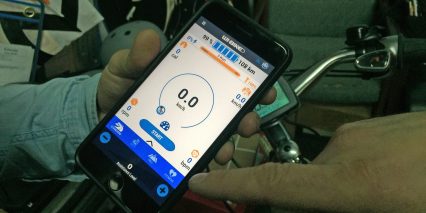

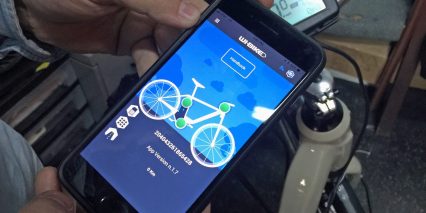
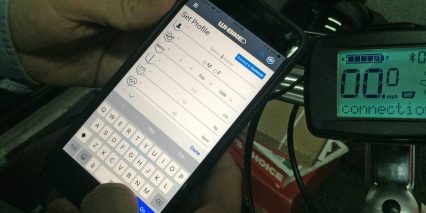
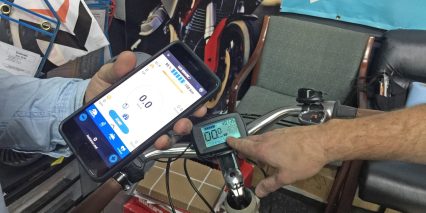
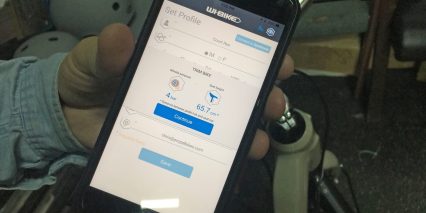
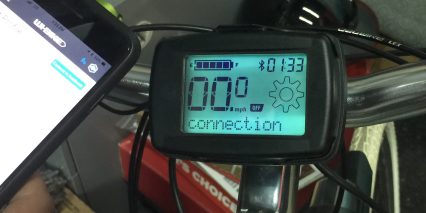
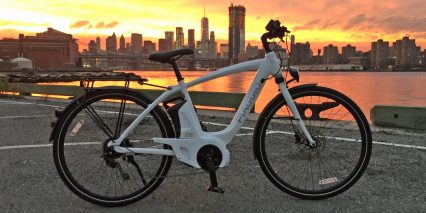
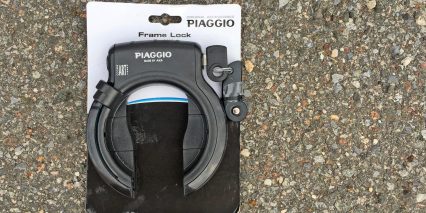
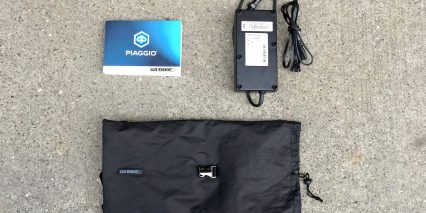
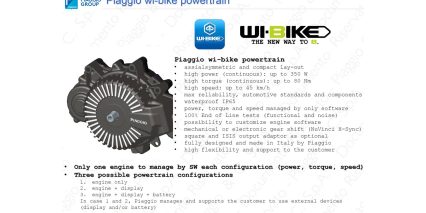

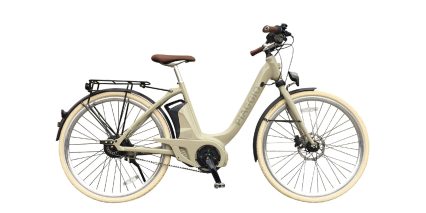
Mike
7 years agoDoes this ebike have a throttle ? You say its Class 3, and maybe I missed it, but no mention of throttle.
ReplyCourt Rye
7 years agoHi Mike! No, the Piaggio ebikes do not have throttles at this time. The different classes are like this: Class 1 is pedal assist up to 20 mph, Class 3 is pedal assist up to 28 mph, and Class 2 is throttle (and maybe pedal assist) up to 20 mph. If an electric bike goes faster than 20 mph with a throttle, it is Class 4 and illegal to use in public places other than off-highway vehicle trails or roads. I hope this helps! Here’s a deeper article about ebike classes and regulation.
ReplyAJ
7 years agoHello Court.
I am very close to putting down a deposit on a Piaggio Wi-bike Active Deore here in Vancouver, Canada. I have a huge case of range anxiety. I weigh 180 lbs. Here is a link to a map of what would be the type of ride I would expect to complete with lots of assist on the hills.
Is there anyone or anywhere that I can get someone to tell me yes or no? That I can expect to do that ride without worrying about running out of juice? I can’t be expected to plunk down $4,000+ on a bike that might not be able to do what I am buying it to do. To me, THIS is the problem with the current electric assist bike market. AJ
ReplyCourt Rye
7 years agoHi AJ, I have sent your comment to the Piaggio Wi-Bike rep from the videos, Larry Ferracci, and asked him to comment. In the meantime, you can try using an ebike range estimator tool like this to get some idea of range. I hope this helps, each bike is different but mid-motors tend to be very efficient. It depends on your weight, your height, what you’re wearing (if it catches the wind), how windy it is, how full your tires are, how smooth the terrain is, how many hills, how fast you accelerate, if the street is wet etc. but you should be able to get decent range in the lower and mid levels of assist :)
ReplyAJ
7 years agoThanks Court. I appreciate all the information you provide with this website.
MarkB
7 years agoCan you clear up the amount of Newton output The Active model outputs? Some say 60 but you put down 80 in your description! Want to compare this to the Bosch Performance Line Speed. Thank you!
Replycourt
7 years agoHi Mark, I got the feedback from the guys at Piaggio but am never able to measure this stuff myself. I cannot say one way or another, could you please link to the other sources that say 60 Nm? I could have also made a typo. Sorry I cannot be more specific or offer more insights right off the bat. Maybe compare the two videos when I ride, I feel like the Bosch Speed motor is a real leader in the space in terms of power and torque but it definitely fades near 27 and requires some real pedal effort to hit and exceed 28 mph on flats. Compared to the Stromer models, it feels weak, compared tot he Piaggio Wi-Bike Active Plus, it probably feels similar.
ReplyTom
4 years agoHi, I currently have a class 1 Piaggio. Is there a way to get it up to class 3 with an upgrade? Thnx!
ReplyCourt
4 years agoHi Tom! My experience with these ebikes is a bit limited and I haven’t looked at them for a couple of years. Perhaps a local dealer could update the software, but my guess is that it’s unlikely because the bigger companies are more careful and “locked down” with their performance due to legal concern. Since this ebike is using a more custom motor and battery (probably controller as well), I suspect that there are fewer “speed dongle” setups that can convert it from Class 1 to Class 3 aftermarket. Perhaps you can check on the Piaggio ebike forums though and see if anyone chimes in with suggestions.
Reply